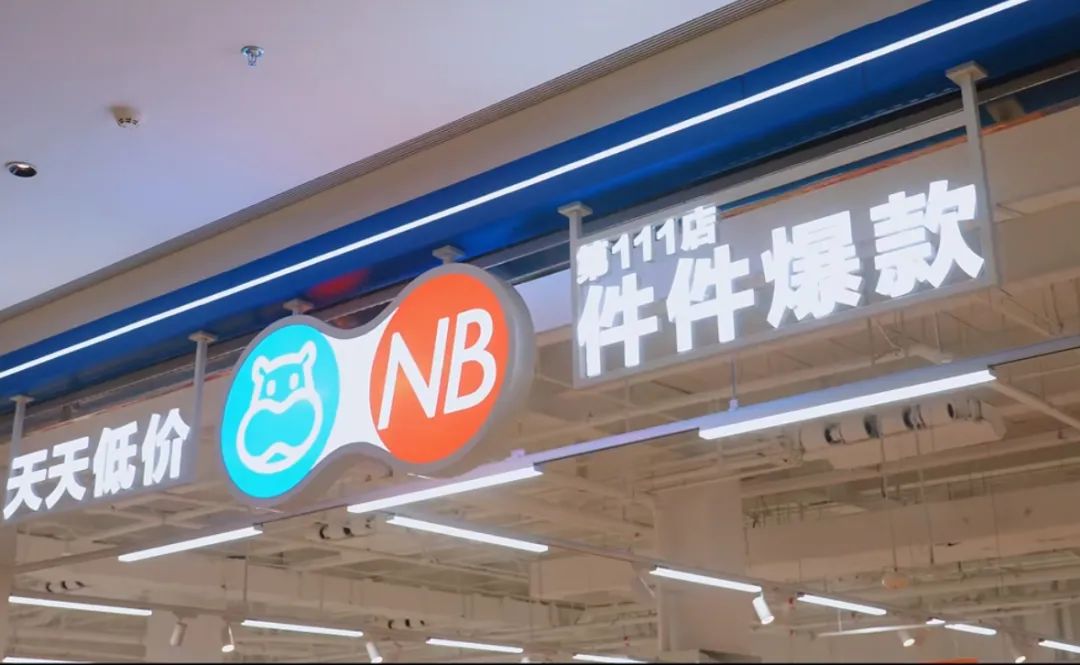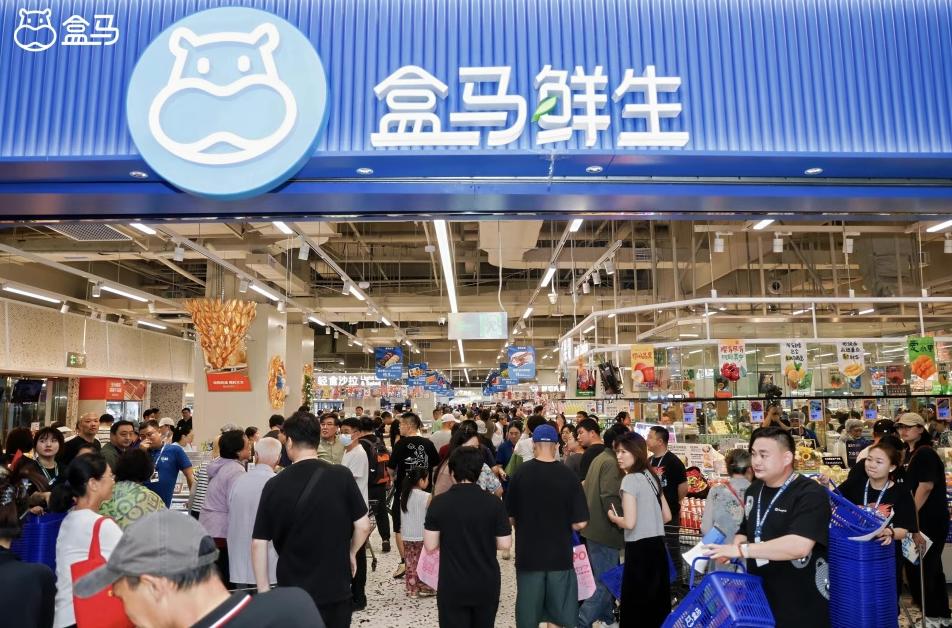JD.com, Meituan, and Hema Prepare for a "Defensive Battle" in the Hard Discount Supermarket Sector
![]() 08/08 2025
08/08 2025
![]() 679
679

Written by Dou Wenxue
Edited by Midnight
In 2025, hard discount supermarkets have emerged as a thriving business segment.
On one hand, traditional supermarkets and fresh food e-commerce platforms are expanding their hard discount offerings, with examples including Lianhua Hua Shang launching Lianhua Fude, Wumart Group introducing Wumart Value Hard Discount Stores, and Dingdong Maicai unveiling Dingdong Outlet.
On the other hand, Alibaba, JD.com, and Meituan are all vying for a slice of this lucrative pie.
First, it was reported that Meituan's inaugural hard discount supermarket project, "Happy Monkey," would open at the end of August. Subsequently, JD.com revealed to the media on August 5 that it would open five JD Discount Supermarkets in Suqian, Jiangsu, and Zhuozhou, Hebei, during the same month.
Simultaneously, Hema has been increasingly focusing on its hard discount supermarket format, Hema NB, this year.

It comes as no surprise that Alibaba, JD.com, and Meituan are increasing their investments in hard discount supermarkets.
Hema NB, which opened its first store as early as 2021, has become a bellwether for the competitiveness of this business model.
In recent years, as the demand for "quality-to-price ratio" has surged, the market potential for hard discount supermarkets has further intensified, attracting more companies to recognize the vast market space available. Hema NB has also accelerated its expansion in recent years.
The other two platforms, JD.com and Meituan, both possess the capabilities to operate hard discount retail stores. Online, both platforms boast high monthly active users and highly engaged customers. Offline, they also have well-established logistics and distribution systems, along with rich supply chain resources.
Currently, both platforms have been actively showcasing their progress in discount retail. It is evident that, starting from August, more top players will enter the hard discount supermarket sector, and a fierce "battle" for market share will soon commence.
1. August Brings an Intensified "Scramble" for Hard Discount Supermarkets
Before JD.com and Meituan announced their upcoming store openings, relevant preparations had already commenced.
In June and December of last year, JD.com transformed two Huaguan Discount Supermarkets in Fangshan District, Beijing, for pilot projects. Huaguan Supermarket was previously a chain supermarket in Fangshan District, Beijing, and became a wholly-owned subsidiary of JD.com in 2021.
Meituan exhibited some signs in April. At that time, it launched a WeChat mini-program named "Happy Monkey," with the certification entity Hangzhou Xiangxian Technology Co., Ltd., which belongs to the Meituan Elephant Supermarket system. This account is also associated with other Meituan mini-programs such as Meituan Dining, Meituan Power Bank, and Meituan Takeout.

Subsequently, news about JD.com and Meituan's discount supermarkets to be opened increased, with details about the location, area, and subsequent planning of the first stores gradually emerging.
JD.com revealed that the first Zhuozhou JD Discount Supermarket store is known as "the first large-scale discount supermarket format in China," featuring a store area of 5,000 square meters and offering over 5,000 cost-effective daily necessities.
Another market source stated that Meituan's Happy Monkey Supermarket has currently signed around 10 stores, with 4 undergoing or having completed renovations and awaiting opening. The first store is expected to open in Gongshu District, Hangzhou, with an area of approximately 800-1000 square meters for the initial batch of stores.
While JD.com and Meituan are accelerating their entry, Hema, as an established player, is also refining its business model and focusing more on the discount format.
Since March last year, Hema has closed more than half of its Hema X membership stores. Now, the last remaining Hema X membership store in Shanghai, Senlan, will officially close on August 31.
This signifies that Hema has abandoned the high-end warehouse membership store format it has operated for five years.
On the flip side of abandoning membership stores, Hema will concentrate more on Hema Fresh and Hema NB. One continues the already established model of fresh food supermarkets, while the other employs a low-price, discounted, community-based service model to complement Hema Fresh's advantages.
Among them, Hema NB entered the market earlier than other players and is now entering a phase of accelerated expansion. It opened up the franchise model last year and now has over 200 stores, with plans to reach 300 stores by 2025.
As the first hard discount supermarkets of Meituan and JD.com successively open, the battle for cost-effectiveness among the three brands will also truly commence.
Meituan's previously launched Happy Monkey mini-program featured the slogan "Good goods are not expensive, saving money is not tiring." JD.com has clearly stated that the prices of discount supermarkets will generally be lower than market conventional prices. In the two pilot Huaguan Discount Supermarkets, slogans such as "Low Prices Every Day" and "Welcome to Compare Prices" are ubiquitous. In the product catalog published on its official account, some products are priced below the market average.
Hema NB has always adopted the "Low Prices Every Day" model. On this foundation, it recently underwent a brand upgrade. In core categories such as dairy products, the brand name "Hema NB" has been replaced by "Super Box Calculation NB," and the product supply chain and packaging design have also been comprehensively updated to further distinguish it from Hema and strengthen its positioning of extreme cost-effectiveness.

Image source: Hema NB official Xiaohongshu account
Furthermore, the land grab by each company may also commence soon.
Hema NB, which has already opened up franchising, is continuing to accelerate its coverage of lower-tier markets. Unlike Hema NB, which is mainly concentrated in the eastern China region, JD.com is initiating its layout in northern cities and gradually promoting it nationwide. Meituan Happy Monkey's current main layout is in more developed areas such as Hangzhou and Beijing. Currently, Meituan has set a preliminary target of 1,000 stores for Happy Monkey.
2. Why is the Hard Discount Supermarket Cake So Attractive?
A sector accelerates its rise on the one hand because it inherently possesses rich market development potential and on the other hand because it meets current market demands.
The hard discount supermarket market fulfills these two trends.
According to China Retail Industry Outlook 2025 data, China's hard discount market will exceed 200 billion yuan in scale by 2024, with a penetration rate of only 8%, while the penetration rates in Germany and Japan are 42% and 31%, respectively.
Data released by the internationally renowned consulting firm NielsenIQ indicates that the incremental sales share brought by discount products globally increased by $6.11 billion in 2024, and the global discount retail channel grew by 8.2%, making it the third fastest-growing retail channel in the past year.

While discount retail channels are accelerating their growth, sales of key fast-moving consumer goods in offline channels have declined.
According to industry report think tank data, from January to November 2024, sales of key fast-moving consumer goods across all channels increased by 3.8% year-on-year. Among them, online channels led with a growth rate of 10.8%, while offline channels showed slight weakness with a decline of 0.7%.
Discounting is also listed as one of the three major trends in the evolution of China's retail channels in 2025 in this report.
For consumers, purchasing lower-priced and quality-assured goods is their primary demand.
For internet giants, traditional supermarkets, and other enterprises, discount supermarkets can reduce costs and selling prices by optimizing the supply chain, streamlining SKUs, and increasing the proportion of private brand products.
Once the discount supermarket model proves successful, with its light volume and characteristics that meet consumer demand, it can rapidly expand to more markets and regions. Even if the gross profit margin of a single store is low, it can still aid enterprises in achieving new growth.
The market space is vast, and Hema entered the market earlier, having explored this sector for four years.
The original predecessor of Hema NB was Hema Neighborhood, which started as a community group buying model, focusing on "online ordering + next-day pickup." Subsequently, Hema Neighborhood merged with Hema Outlet to form the "Hema NB Business Department," attempting to transition from soft discounts (near-expiration goods) to hard discounts + community stores, emphasizing low-priced, high-frequency, and rigid-demand goods.
At the beginning of 2023, Hema NB piloted the hard discount model in Shanghai and verified the feasibility of profitability, laying the groundwork for it to become one of the core businesses aiding Hema in achieving its GMV target.
Since March 2024, when Yan Xiaolei, the new head of Hema, took office and set a target of reaching 100 billion yuan in GMV within three years, Hema NB has received increased attention. It has not only become one of the core businesses as important as Hema Fresh but also opened up franchising in the same year and developed rapidly.
Currently, Hema NB has formed a certain regional barrier in Jiangsu, Zhejiang, and Shanghai. The strategy of achieving lower prices through private brands has also begun to bear fruit.
The financial report reveals that Hema's GMV reached 75 billion yuan in fiscal year 2025, achieving full-year profitability for the first time, with the Fresh and NB formats contributing over 80% of revenue.

Image source: Hema NB official Xiaohongshu account
It can be said that the hard discount supermarket cake is enticing. Therefore, it is understandable why both Meituan and JD.com wish to enter. It is foreseeable that after their entry, players including Hema NB will also face increased competitive pressure.
3. Is Operating Hard Discount Supermarkets Aimed at Better Competing in the Instant Retail Battle?
Opening hard discount supermarkets allows Alibaba, Meituan, and JD.com to better seize the instant retail pie.
Since the essence of instant retail is short distance + fast fulfillment, and hard discount supermarkets can meet consumers' cost-effectiveness demands for daily necessities through the model of streamlined SKUs + direct sourcing from the origin + private brands, they can also become natural "fulfillment nodes" with their community-based store layout.
Instant retail is currently a key area of focus for Alibaba, Meituan, and JD.com.
Among them, Meituan leverages its ability to integrate online and offline, along with its advantages in delivery speed and SKU richness, to compete for the instant retail pie.
For example, Meituan recently launched the instant retail brand Meituan Flash and gradually expanded its categories, such as 3C home appliances, fresh food, beverages, fast-moving daily necessities, etc.
Simultaneously, Meituan is also accelerating the expansion of Elephant Supermarket. According to its plan, Elephant Supermarket will gradually expand to all first- and second-tier cities and gradually cover 200 high-quality county-level agricultural production areas nationwide in terms of the supply chain.
Unlike Meituan, JD.com carved out a path in the takeout market through "JD Express Delivery" and then integrated its robust supply chain and warehousing and transportation capabilities to continuously innovate the supply chain model, such as launching the "Dish Partnership" plan and opening new self-operated restaurants like "Seven Fresh Kitchen."

Image source: JD Seven Fresh official website
On the other hand, Alibaba is more focused on strengthening the integration of different business segments.
For instance, it added Taobao Flash Sale to the homepage of the Taobao app, collaborated with Ele.me, and distributed large red envelopes to continuously "heat it up." Additionally, Alibaba is also enhancing the presence of Hema in Ali-affiliated platforms, such as including Hema in the Taobao 88VIP system and adding a first-level entry for Hema in Taobao.

Image source: Hema official website
Of course, in the "tug-of-war" of instant retail, the three platforms also have their own shortcomings to address, so each faces different challenges and hopes to gain different benefits from their layout in hard discount supermarkets.
Among them, the primary challenges for Meituan and JD.com lie in supply chain efficiency.
Due to the complexity of operating offline supermarkets far exceeding that of online platforms, substantial investment and refined management are required in procurement, warehousing, inventory management, quality control, and other links.
For example, to ensure the price advantage of goods in discount supermarkets, it is necessary to optimize the supply chain and reduce procurement costs, but this is not an easy task. It requires establishing long-term and stable cooperative relationships with suppliers while also mitigating risks such as market price fluctuations.
Alibaba's challenge lies in the coordination efficiency of different business segments. How to achieve efficient synergy between Taobao Flash Sale, Ele.me, and Hema to avoid issues such as business overlap and resource waste is a critical problem that Alibaba needs to solve.
For instance, in the delivery process, how to reasonably allocate Ele.me and Hema's delivery resources, improve delivery efficiency, and reduce delivery costs are all issues that Alibaba needs to deeply consider.
The struggle for supremacy in the hard discount supermarket sector is far from straightforward. It transcends a mere price war, serving as a rigorous test of each company's supply chain prowess, private label operations, product curation skills, and more. The strategies employed by these three companies will inevitably ripple through the entire hard discount industry. Ultimately, the key to gaining an edge lies in who can truly resonate with Chinese consumers' quest for value for money.






